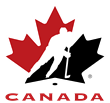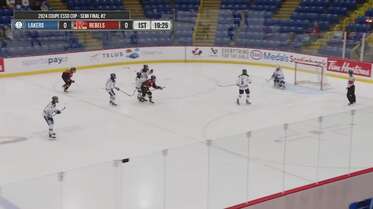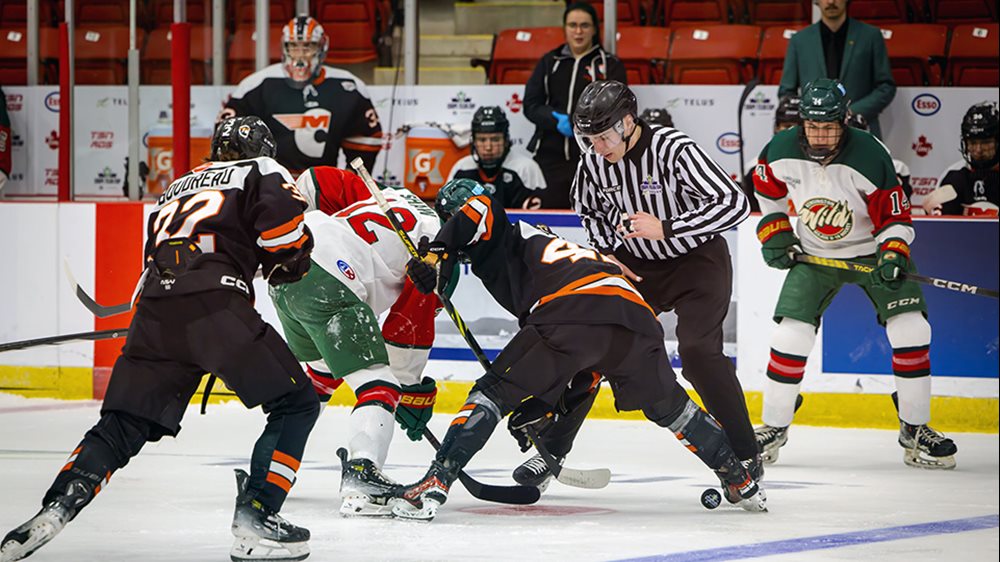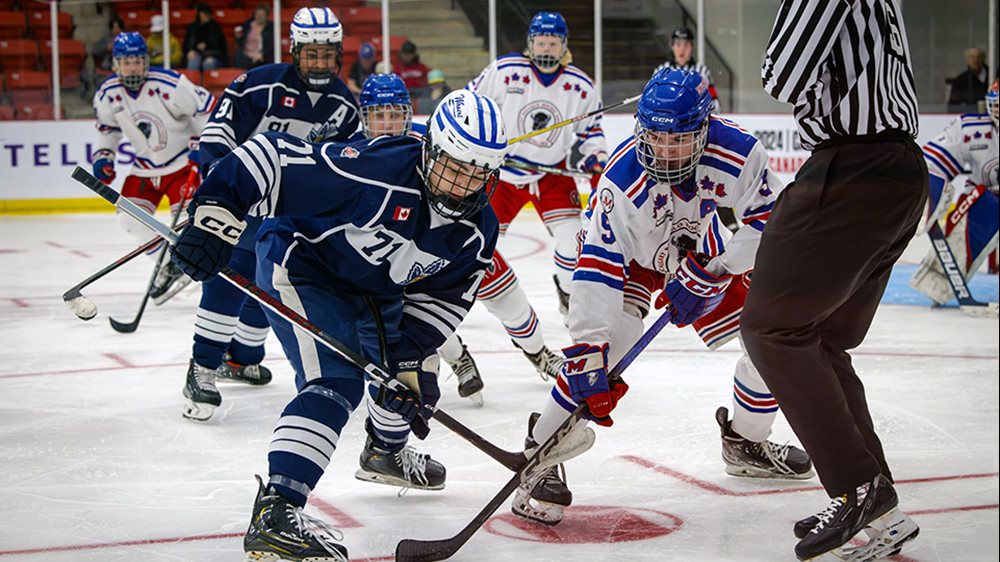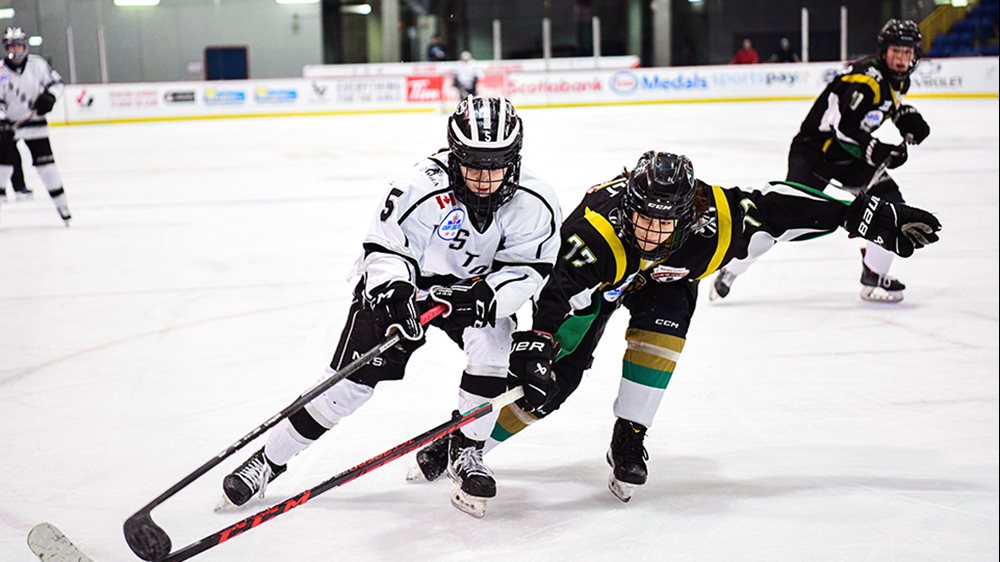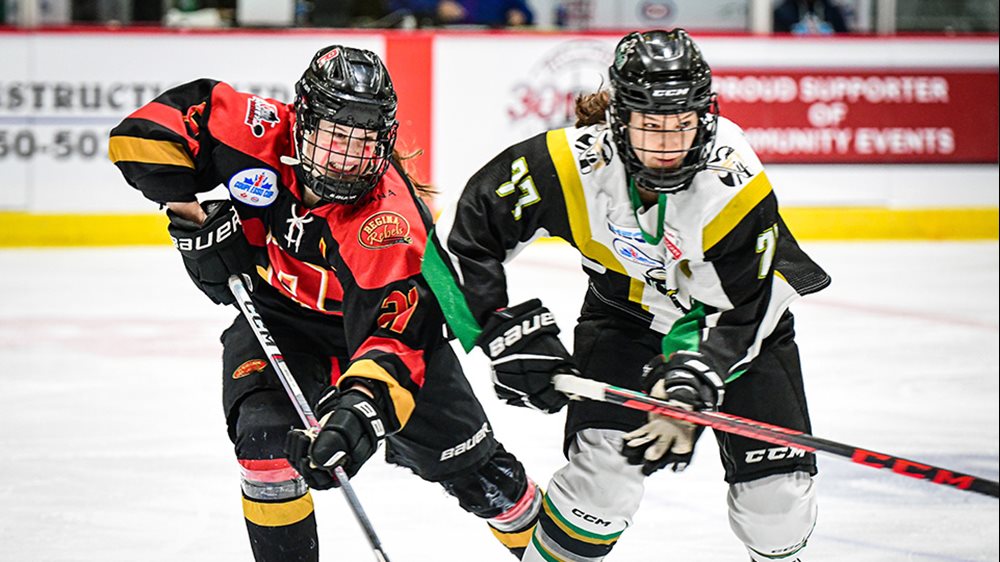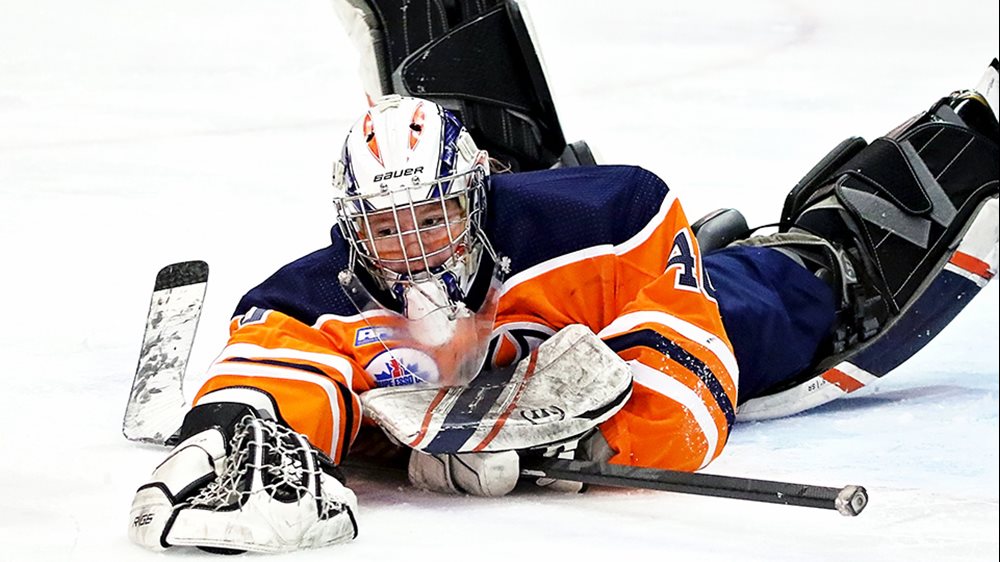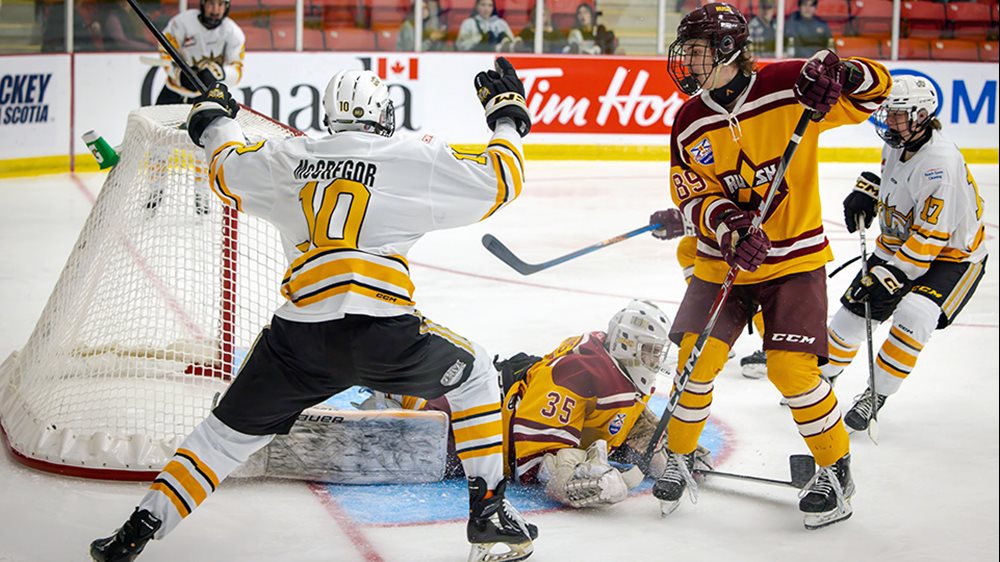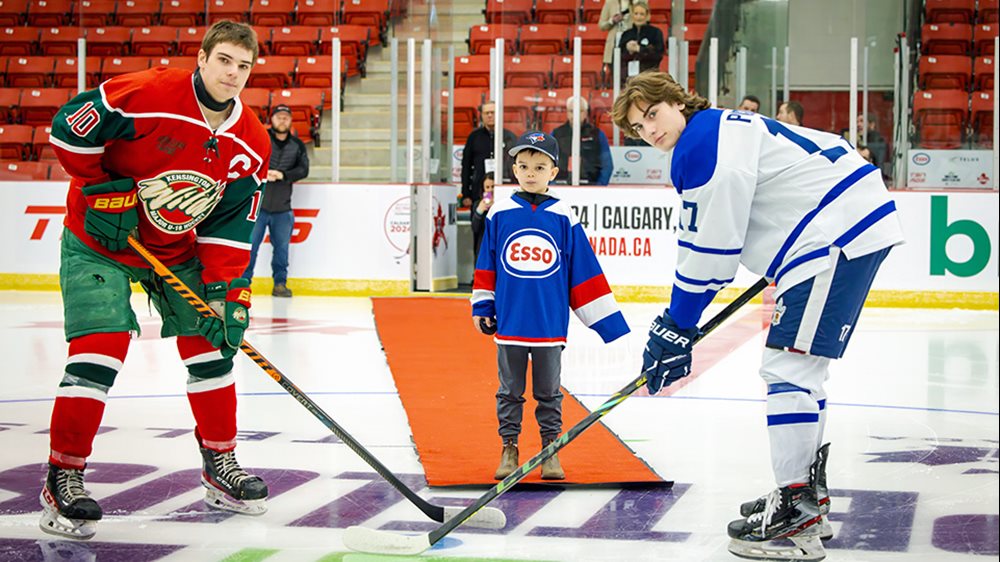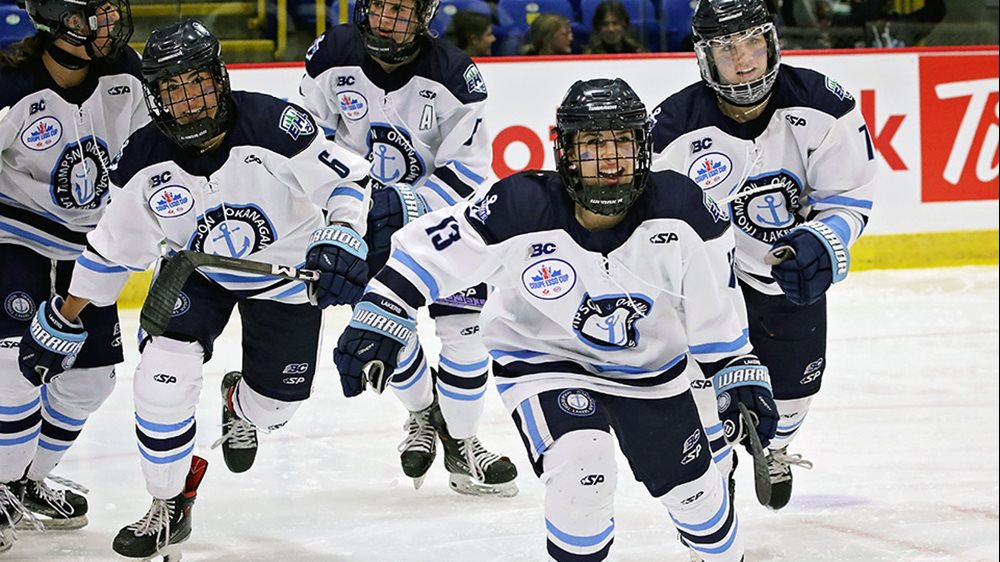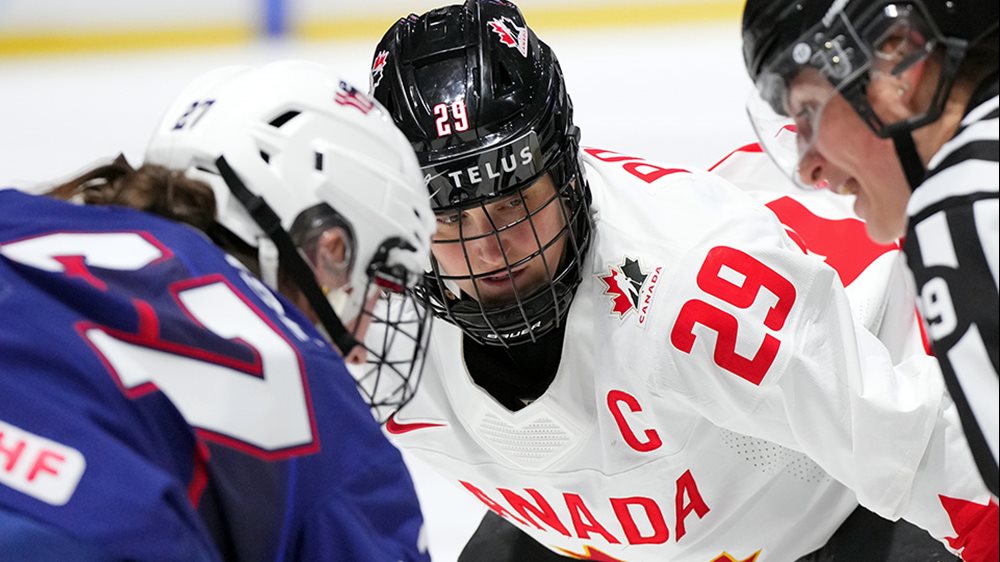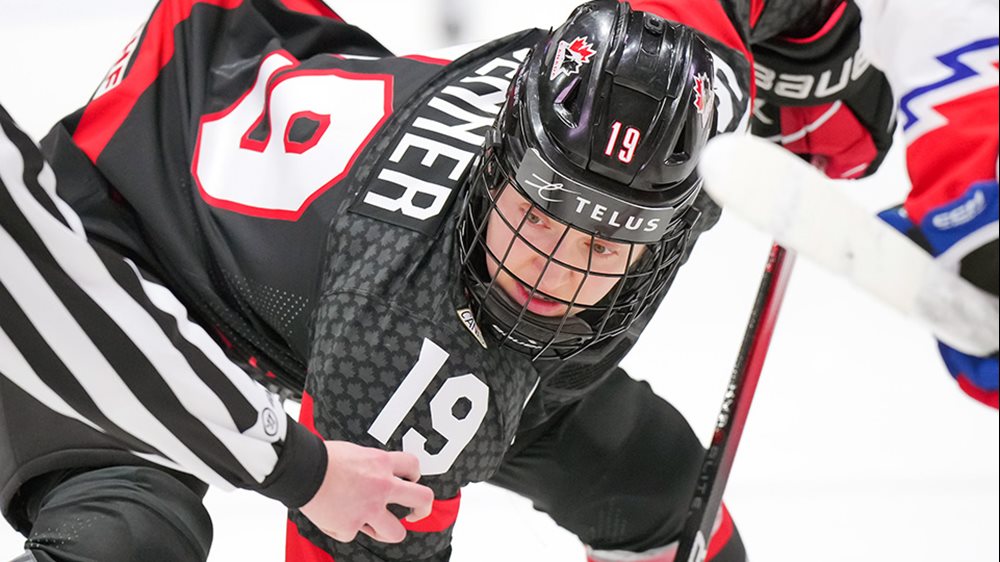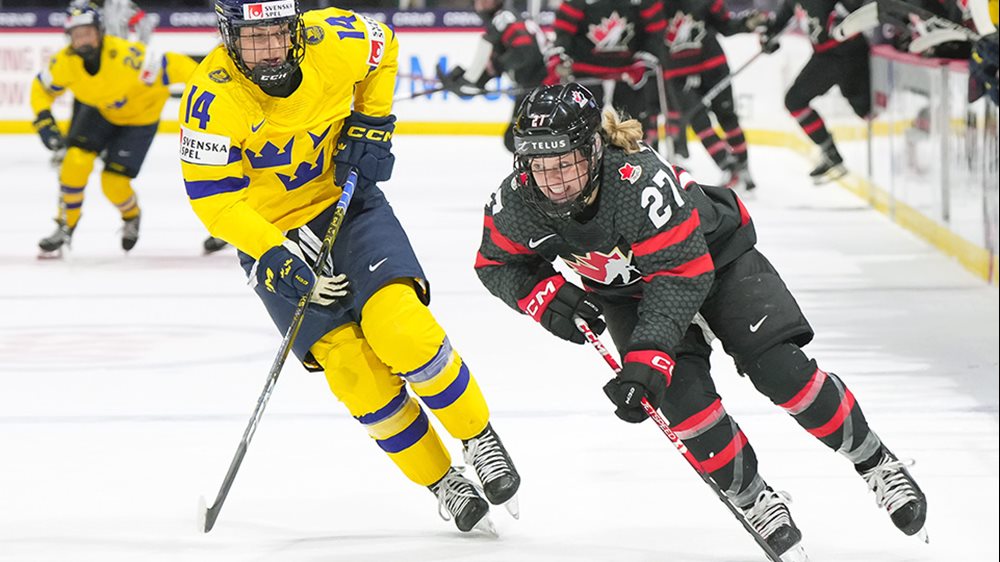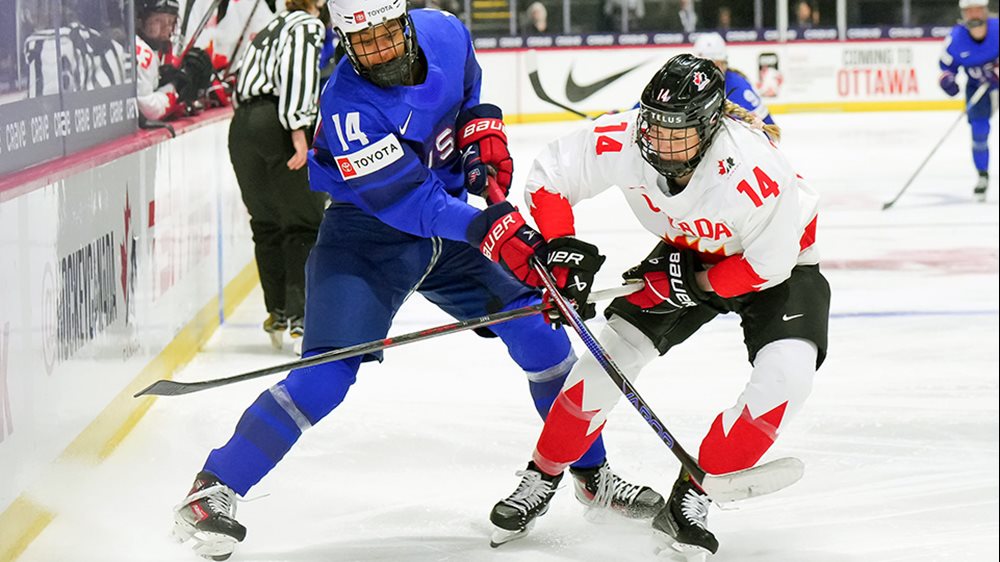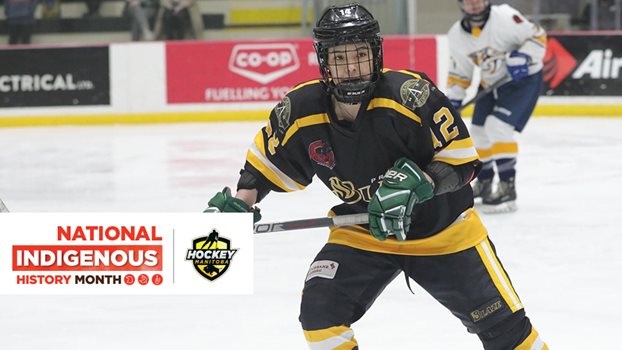
Finding new ways to win
Ready for the next step in her hockey journey, Keyanna Lea is embracing being behind the bench and serving as a role model for young Indigenous players
Keyanna Lea has been doing a lot of winning lately, both on the ice and behind the bench.
The 21-year-old from Berens River First Nation won the Manitoba Women’s Junior Hockey League (MWJHL) championship with the Prairie Blaze this past April and was named playoff MVP after registering 13 points (7-6—13) in eight playoff games.
Just over a month later, Lea was an assistant coach with Team Manitoba as it took home a gold medal at the 2022 National Aboriginal Hockey Championships (NAHC) in Membertou, Nova Scotia. It was Lea’s first time coaching the provincial team after winning back-to-back gold medals as a player in 2017 and 2018.
“It was definitely a different perspective for me. Going back there was an unreal experience because last time I was there I was playing (in 2018) and we won the gold,” Lea says. “It was hard for me to transition with the nerves and the feelings more so because I was feeling what the girls were feeling but as a coach, you don’t want to show the emotions. Being a coach was definitely a humbling experience and let me tell you, being in that gold medal game, it was so hard to be a coach because all you want to do is go out there and play yourself, but the girls made my job easy by doing what was asked of them from the coaching staff.”
Lea’s hockey odyssey has been interesting, to say the least.
After suiting up for the Varsity Prep team at Balmoral Hall in her Grade 11 year in 2016-17, Lea and her twin sister Keyara were approached to move to Boston to play for the Shamrocks in the Junior Women’s Hockey League (JWHL), the same league that Balmoral Hall plays in. Keyanna had a solid 2017-18 season for Boston, scoring 11 goals and adding four assists in 22 games.
Following high school graduation in 2018-19, the sisters were close to committing to play for the University of Manitoba, but they ended up going back to the JWHL to play for the New England Hockey Club.
They returned to Winnipeg after one season in New England and Lea was offered a job as a support worker with Shawenim Abinoojii, a not-for-profit organization in Riverton, Man., that works with First Nations children and families.
She plans on playing one more year with the Blaze, but knows her elite playing days are numbered – hence the transition to coaching.
“After the coaching experience at NAHC, I’ve realized that I do fit in this kind of area so I would love to pursue coaching more. With my job, I’m able to set time aside.” she says.
Lea gives full credit to Dale Bear, her head coach with the Blaze and the long-time head coach of Team Manitoba at the NAHC, for not only encouraging her to pursue coaching, but for the tremendous impact he has had on her hockey career, both on and off the ice.
Lea had previously helped Bear with Team Manitoba tryouts as an on-ice instructor and bench coach, so when he asked Lea to be his assistant coach, the decision to accept was not a hard one.
“Kind of since Day 1, (Dale) has been someone that I have looked up to in terms of him allowing me to be the player that I wanted to be,” Lea says. “He listened to me. He gave me constructive criticism. He gave me the feedback that I needed as a player and as a person. I have always felt close to him. He has always been there for me. It’s hard for me to look at him as a coach because of the things he has done for me in my hockey career and in life. He brought me to my full potential.”
Bear has always seen natural leadership qualities in Lea, which is one of the reasons he nudged her to get behind the bench this past season.
“Keyanna always talked about giving back so I brought up coaching with her and she jumped at the opportunity,” Bear says. “Keyanna displays great leadership when she plays, and that type of leadership is what we want in our coaches that coach in our program. She is very focused, but most of all she has a big heart and knows exactly what is going through these young players' minds, which is a huge benefit for our players and myself having her on the bench.”
Lea has her Coach 1 certification through the National Coach Certification Program, and she plans on obtaining her Coach 2 certification this coming season. She was recently approached to coach a U9 team in Riverton next season.
“I would love to go back home and provide an experience for those young kids like I had,” she says. “Hockey has taken me as a player everywhere, so wherever the coaching may take me, if it’s in the Interlake, in Manitoba, wherever it takes me, I would go.”
To say that hockey has come full circle for Lea would be cliché, but also accurate, as she focuses on the next chapter of her hockey career and giving back to her community.
“Keyanna takes a lot of pride in her Indigenous ancestry and displays hard work and a great attitude,” Bear says. “These traits are exactly what we want to instill in our young Indigenous athletes. In most cases Indigenous players feel left out or intimidated to attend tryouts/camps, but with more Indigenous coaches this will help bring more Indigenous players to programs that didn't really have that diversity on their teams or leagues.”
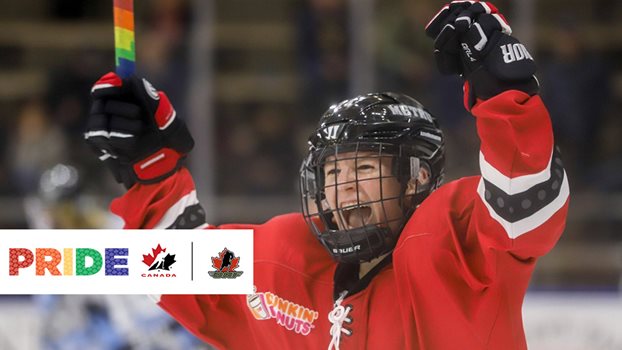
The power of visibility
A Team Canada alumnus, Isobel Cup champion and transgender advocate, Harrison Browne is using his platform to educate the hockey world and beyond
Hockey provided Harrison Browne with an opportunity to feel openly comfortable. It also granted him a voice to proudly discuss his journey.
Even in retirement, his message and leadership are important and welcomed, likely even more acoustically today than when he played.
“I wouldn’t be where I am today without hockey,” says Browne, a two-time Isobel Cup champion with the Buffalo Beauts of Premier Hockey Federation (PHF). “I wouldn’t be who I am and have the platform I have without hockey.
“Hockey was the first place that I felt comfortable to be myself and a place that I cultivated relationships where I felt supported and could trust people with my identity without judgment.”
As a transgender person and former athlete, Browne appreciates the forum he now possesses to talk, promote – and especially educate – about LBGTQ+ issues and acceptance.
It’s a podium that today permeates beyond hockey and into mainstream society.
“I didn’t set out to be an activist,” he says. “But then I saw the impact of trans visibility and LBGTQ+ visibility and I felt a responsibility to speak out, be vocal and visible to help anybody that can’t be visible like I can.
“I get very protective over my community so, yes, I do now consider myself an activist.”
Since June is Pride Month in Canada and across the world, it is widely used as an opportunity to support and celebrate LBGTQ+ people through parades, dances, festivals and other events.
For Browne, Pride Month is all of that and more.
“It’s about celebrating how far we’ve come and recognizing how far we need to go,” says the Toronto resident. “June is a great reminder of how strong this community is and how supportive we all are of each other.
“And it’s a great way to celebrate who you are as a person.”
Growing up in Oakville, Ont., Browne began playing hockey when he was nine years old, a “geriatric start” to the sport in his own words.
Regardless of when it commenced, it concluded as a solid career that lasted 16 years and included playing for Team Canada at the 2011 IIHF World Women’s U18 Championship and four years of college hockey in the United States, the last three on scholarship at the University of Maine.
From there, his time in the professional ranks stretched over three seasons in the PHF (known then as the National Women’s Hockey League), two with Buffalo and a final campaign in 2018 with the Metropolitan Riveters prior to retirement.
During his entire professional career, he was the first openly transgender athlete in a team sport.
Now 29, Browne has shifted his focus to public speaking and a vibrant acting career, both of which are conduits for trans and LBGTQ+ visibility and advocacy.
“I’ve been very fortunate,” he says. “After I retired from the game, I’m still a voice that people look to in the hockey community. I kind of meshed it with my acting. To be able to have those two worlds align, I certainly feel like I have a voice. And it’s something that I don’t take lightly and I’m very proud of.”
Browne’s appearances include celebrity hockey games and functions, keynote speeches, Scotiabank television commercials and an appearance in an episode of The Last Man, a TV drama series based on the comic book set by the same name.
By his own admission, Browne’s new career and schedule doesn’t permit much time for recreational hockey, something he laments.
However, he will always cherish the game for what it provided prior to his coming out, but especially after he did in 2016.
He said the PHF, its fans and teammates were extremely supportive during his social transition in what also became a pivotal period for LBGTQ+ inclusion in sports.
“They all helped me embrace who I am,” says Browne. “When I came out through hockey, I felt being visible helped a lot of people and the hockey community really helped me.”
Browne believes women’s hockey has been instrumental in inclusiveness, acceptance and a beacon for other sports to follow in pursuit of LBGTQ+ visibility and equality.
“The women’s side is exemplary on how other sports and society as a whole can include the LBGTQ+ community and celebrate people for their differences,” he says. “And to look at people simply as teammates.”
What does concern Browne in this month of celebration are some additional barriers that restrict further progressive movement for the LBGTQ+ community.
The recent influence of “non-inclusive” bills and legislation across North America has created some deep concerns.
In some jurisdictions these laws or bans specifically hinder younger LBGTQ+ people from playing sports and that is a step backwards in our society, according to Browne.
“It’s unfortunate that it comes with people having to fight back, but I have seen a lot of progress in the last five years.
“We’re in a moment right now where we’re fighting for our place, but I do see a lot of hope.”
For more information: |
- <
- >
